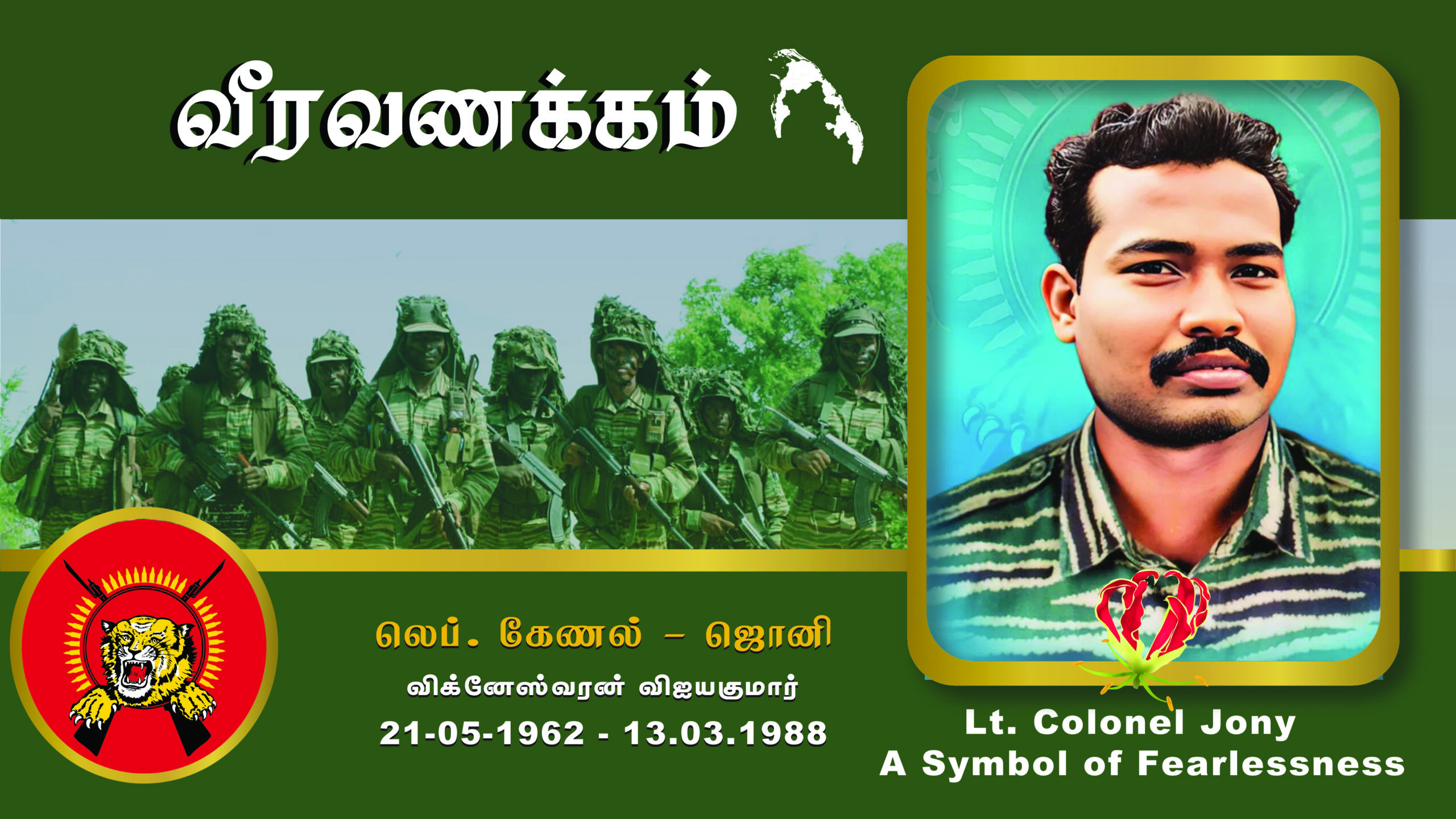

Lt. Colonel Jony – A Symbol of Fearlessness

Lt. Colonel Jony – A Symbol of Fearlessness 13.03.1988
Lt. Colonel Jony lived as the embodiment of fearlessness, gentleness, hard work, compassion for his fellow fighters and civilians, and unwavering dedication.
It is impossible to speak of the events of that era without mentioning both Colonel Kittu and Lt. Colonel Jony. Jony stood out as a key figure alongside Kittu, who was known for his multifaceted leadership.
Born on May 21, 1962, in Saraiyadi, Puloly, near Point Pedro, his birth name was Vickneswaran Vijayakumar. He joined the struggle in 1983 while he was an agriculture student at the University of Jaffna. Although his parents initially opposed his involvement and sent him to study in Colombo, the anti-Tamil pogroms of 1983 pushed him to fully commit to the movement.
During a time when India supported Tamil militant groups for its own strategic reasons, about 200 LTTE members were sent for training in two batches. Jony traveled to India but did not take part in military training; instead, he trained in telecommunications and returned to Sri Lanka to serve.
He operated in Mannar and Jaffna during a time when Jaffna was under full military control. Once, when the army surrounded him at Valvettithurai and demanded identification, he opened fire and escaped. Together with Major Vasu, Jony sought opportunities to attack army units, roaming with grenades in hand. Colonel Kittu was instrumental in mentoring them and positioned Jony as his second-in-command.
Jony undertook many duties—visiting battlefronts, meeting fighters, understanding ground realities, ensuring the well-being of cadres, training new recruits, and inspecting facilities like the Thumpu factory and explosives plant. He knew every inch of Jaffna district intimately and maintained data on all locations. In Kittu’s absence, Jony often led and participated in attacks.
On April 10, 1985, Jony and Lt. Vasan played a major role in capturing the Jaffna Police Station, a highly fortified base guarded with mines, fences, and a 60-foot watchtower. Its capture led to the closure of the Gurunagar army camp and marked a turning point in the LTTE’s control over Jaffna.
Jony survived three serious injuries, including in the battles at Kattuvan and Sudumalai against Indian forces. One wound left the skin on his forehead soft after a bullet exited near his ear. Later, during the war against India, he returned to India. When the LTTE leader came back to Tamil Eelam in 1987, he recognized Jony’s capabilities and entrusted him with leading a 90-member elite attack unit. This may have been the LTTE’s first formally organized assault team. In an operation near Achuveli, Jony killed six soldiers and seized their weapons.
While Jony was in India, the Indian government launched a heavy propaganda and military campaign against the Tigers, claiming imminent capture or assassination of the LTTE leader. Despite the threats, the leader remained resolute, telling his fighters that he would carry the struggle forward as long as he lived and that others should continue it after him.
Following the assassination of LTTE leaders Kumarappa and Pulendran by India under the guise of peace, the LTTE leadership was furious. In response, Colonel Kittu sent Jony to India as a peace envoy, not to surrender, but to understand the situation better.
He landed in Nedunkeni and was covertly brought to Visuvamadu. I met him there with Major Thangai. During our two days together, Jony expressed his concern that the leader’s life was in grave danger and believed some sort of negotiation was necessary before proceeding further. If peaceful efforts failed, he said he was willing to undertake a hunger strike in India.
As we traveled, Jony pointed out specific areas where the Indian army might set up camps and create food and water blockades. His predictions turned out to be accurate.
Before I took him to meet the leader, I told him, “Share your thoughts openly.” When we arrived at the base late at night, the leader, already awake, asked if Jony had arrived. Even while resting, the leader was always alert.
Jony spent two or three days with the leader, sleeping on mats on the ground, as no furniture was available. He had long, sincere conversations with the leader, full of clarity and conviction. When he later prepared to return to India, I asked him privately, “Did you say everything?” He simply replied, “I said nothing—just listened.”
The leader had told him: “Say you came here under Indian escort. Then return to India, go underground, and come back later. We need you to train new cadres. We must capture the Jaffna district.”
Jony agreed: “I’ll go now. But I’ll return, ready for that mission.” Despite being in a moment of uncertainty, Jony left with determination and belief in victory.
Unfortunately, he was ambushed and killed by Indian forces near Theraavil before he could return. We lost not just a brave soldier but a gentle, refined, and deeply respected man. Jony knew the Jaffna region like the back of his hand. From 1983 until his death, his contributions were enormous.
He lived a life respected not only by fellow fighters but also by civilians. Though we lost such a talented warrior, our struggle continues. Remembering him reminds us of the mission he left behind—a mission we must carry forward.
This speech about Lt. Colonel Jony, was originally broadcast on the “Voice of the Tigers” radio program on his 18th memorial anniversary.
By Yogenthiram Yogi,
Head of the History Department
Liberation Tigers of Tamil Eelam
Tamil Eelam
“Publikation thaagam, Thamizheela Thayakam”
Translation by Hari
![]()